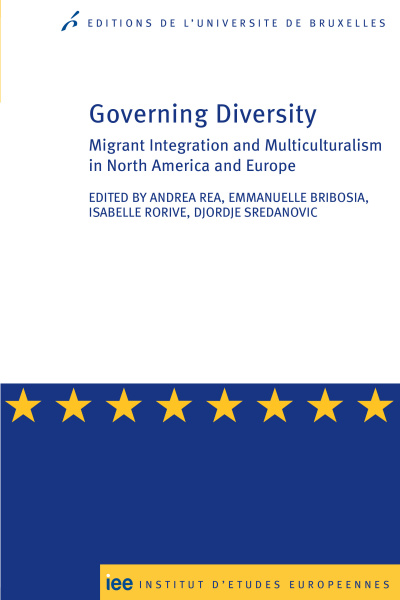Governing Diversity
Migrant Integration and Multiculturalism in North America and Europe
Première édition
During the 2000s, the European Union has witnessed a significant change in terms of integration policies for immigrants. Countries like Sweden and the Netherlands, who were both pioneers of multicultural policies in Europe both significantly limited such policies in the late 1990s. Lire la suite
Restrictive measures, requiring higher levels of integration in order to access and maintain legal statuses, have been enacted by most Western European countries since the 2000s, especially after 9/11. In October 2010, in a very polemic context on immigration and immigrant integration, the German Chancellor, Angela Merkel, announced that Germany was to be considered a multicultural failure, words that were soon echoed by the Belgian Prime Minister Yves Leterme, the British Prime Minister David Cameron and the French President Nicolas Sarkozy. These sensational statements, which by and large avoid defining the concept of multiculturalism, are based on a reaffirmation of “Western values” and strengthening of national identity. These statements express the need to review the policies on integration of immigrants, in the sense that they should be more active and voluntarist, more organized by the state and more supported by the EU. In the background, one can see fear for Islamic extremism, but also the idea that the nation states can put some obligations on immigrants, and that for a too long time we have been focusing on “those who arrive”, rather than on “the society that welcomes them”.
This book intends to address the relationship between, on the one hand, cultural diversity resulting from migration, and, on the other hand, social cohesion and social justice within Western societies. In order to do this, the authors examine what can be described as two contradictory trends in recent public policies towards foreign people or people with a foreign origin: first, the policies against ethnic, racial and religious discrimination; and second, new harsh integration policies for newcomers in Europe. This book aims to provide a trans-disciplinary analysis of the construction of “otherness” in North America and Europe.
Spécifications
- Éditeur
- Éditions de l'Université de Bruxelles
- Édité par
- Andrea Rea, Emmanuelle Bribosia, Isabelle Rorive, Djordje Sredanovic,
- Introduction de
- Isabelle Rorive, Emmanuelle Bribosia, Andrea Rea, Djordje Sredanovic,
- Contributions de
- Ilke Adam, Alejandra Alarcon-Henriquez, John W. Berry, Saskia Bonjour, Emmanuelle Bribosia, Rachel Burns, Tiziana Caponio, François Crépeau, Marco Martiniello, Julia Mourão Permoser, David B. Oppenheimer, Yves Pascouau, Alejandro Portes, Swati Prakash, Andrea Rea, Isabelle Rorive, Gaia Testore, Erik Vickstrom,
- Collection
- Études européennes | n° 61
- ISSN
- 13780352
- Langue
- anglais
- Site web ressource
- Oapen.org
- Catégorie (éditeur)
- > Science politique
- BISAC Subject Heading
- SOC007000 SOCIAL SCIENCE / Emigration & Immigration
- Code publique Onix
- 06 Professionnel et académique
- CLIL (Version 2013-2019 )
- 3283 SCIENCES POLITIQUES
- Subject Scheme Identifier Code
- Classification thématique Thema: Migration, immigration et émigration
Livre broché
- Date de publication
- 28 mai 2018
- ISBN-13
- 978-2-8004-1635-9
- Ampleur
- Nombre de pages de contenu principal : 264
- Code interne
- 1635
- Format
- 160 x 240 x 13 cm
- Poids
- 426 grammes
- ONIX XML
- Version 2.1, Version 3
ePub
- Date de publication
- 22 mai 2019
- ISBN-13
- 978-2-8004-1689-2
- Contenu du produit
- Text (eye-readable)
- Ampleur
- Nombre de pages de contenu principal : 264
- Code interne
- 1689
- Epub-Édition accessible
- Table of contents navigation
- ONIX XML
- Version 2.1, Version 3
Google Livres Aperçu
Sommaire
- Introduction | Djordje SREDANOVIC, Andrea REA, Emmanuelle BRIBOSIA, Isabelle RORIVE
- I. Diversity and Anti-discrimination Policies in North America and Europe
- Intercultural Relations in Plural Societies: A Comparative Perspective | John W. BERRY
- Diversity, Social Capital and Cohesion | Alejandro PORTES, Erik VICKSTROM
- A US Perspective on the Relationship of Immigration Restrictions and Racism | David B. OPPENHEIMER, Swati PRAKASH, Rachel BURNS
- Canadian Multiculturalism in Question: Diversity or Citizenship? | François CRÉPEAU
- Are Equality and Non-Discrimination a Double-sided Argument in the Intercultural Dialogue in Europe? | Emmanuelle BRIBOSIA, Isabelle RORIVE
- Willingness to File a Discrimination Complaint. Examining Socio-Psychological Aspects in Fighting Discrimination through Legal Means | Alejandra ALARCON HENRIQUEZ, Assaad AZZI
- II. European Integration Policies
- Integration Requirements in EU Member States | Yves PASCOUAU
- Testing the Limits of the Liberal Constraint: the Evolution of Civic Integration Policy in Austria | Julia MOURÃO PERMOSER
- The Role of the State and the Image of Migrants Debating Dutch Civic Integration Policies, 2003-2011 | Saskia BONJOUR
- Civic Integration as Symbolic Policy? The Case of the Integration Agreement in Italy | Tiziana CAPONIO, Gaia TESTORE
- Regional Divergence in the Integration Policy in Belgium One Country, Three Integration Programs, One Citizenship Law | Ilke ADAM, Marco MARTINIELLO, Andrea REA
- Biographical Notes

